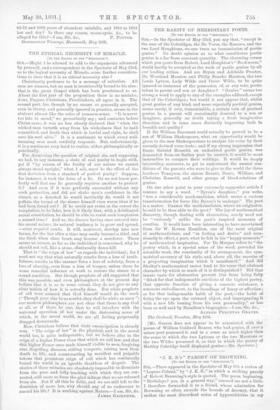"J. K. S.'s " PARODY ON BROWNING.
[To THE EDITOR OF THE "SPECTATOR."]
Srn,—There appeared in the Spectator of May 9th a review of " Lapsus Calami," by "J. K. S.," in which a striking parody of Robert Browning's style is quoted. The poem, beginning, " Birthdays P yes, in a general way," amused me not a little. I therefore forwarded it to a friend, whose admiration for Browning so often exceeds the bounds of decency, that it strikes the most discordant notes of hypercriticism in my nature. This action of mine produced the following retort, which, if it is possible to be unbiassed in the matter of a friend's productions, appears to me to possess no little merit. I may add, in explanation, that I happened to make the un- fortunate remark that if Browning were so deep as his admirers assert, life would be too short to read with any pleasure all his fish-bony effusions :—
"IL E. W. TO W. C. E. Browning ? yes, in a general way You have scanned his verses I must suppose; You have read a poem or two, you say, Enough for a critic, as every one knows.
What then P only this, that, to profit from aught, You must do your part, you must work, not sleep There is corn to be found, if the corn be sought, But bread for none who refuse to reap.
For many may fast, and few may feast, And the few grow fat as the meals go by : But when will the many grow fat, who wait To be fed like nestlings with worm and fly ?
An easy thought in an easy book, Since life is short, is enough, you say : And the difficult thought in an untried nook (Yet the latter is greater) may pass away.
And Browning's lovers you treat with scorn : But which, may I ask, is more probably right,— Who opens his eyes and declares the Morn ? Who shuts them and says 'tis the dead of Night P And if 'twore the former ? still you doubt ? Ah I yours is a prejudice strong, if so.
That wore something lwere vain to argue about : Just think a little, let prejudice go I But, putting aside your vain pretence At criticism, what say we then P Poet ? yes, in the highest sense, For the best if not for the most of men."
—I am, Sir, &e.,







































 Previous page
Previous page